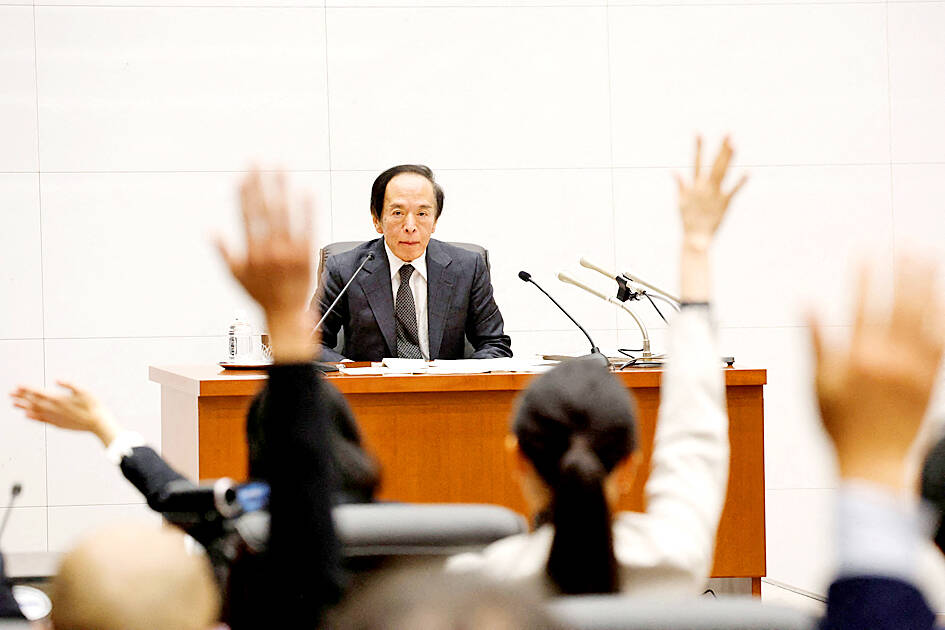Bank of Japan (BOJ) Governor Kazuo Ueda yesterday joined his deputy in raising market expectations of a potential interest rate hike next week, boosting the yen and signaling the central bank is doing its utmost to avoid a global market crash that followed the rate hike in July last year.
The governor also indicated rising confidence over wage increases after hearing encouraging views at various new year events and at the BOJ’s recent branch managers’ meeting. He was speaking at an event hosted by the Regional Banks Association of Japan.
That suggests one of two key elements the bank needs ahead of a rate hike is cleared, as it tries to gauge the future of the US economy when US president-elect Donald Trump takes over the White House next week.

Photo: Reuters
Following Ueda’s remarks, the yen strengthened as much as 0.5 percent to ¥157.17 against the US dollar, after earlier hovering at about ¥158.
Ueda’s latest comments come as BOJ watchers seek clues about the possibility of an increase in borrowing costs in the lead up to the central bank’s policy meeting on Wednesday and Thursday next week. Overnight index swaps show a 68 percent chance of a rate hike this month, with the odds rising to 86 percent by March. The governor’s comments yesterday were more specific about what might be discussed at the meeting compared with his views earlier this month.
Ueda’s remarks suggest the central bank’s two top officials are on the same page. BOJ Deputy Governor Ryozo Himino on Tuesday said the policy board would decide whether to raise rates, signaling the possibility of a hike and boosting market expectations.
“Ueda’s comments are broadly similar to Himino’s, but given he’s the governor, the weight of his words are different,” Kansai Mirai Bank currency strategist Takeshi Ishida said. “The market interpreted it as an increasing possibility of a January rate hike.”
Following the BOJ’s rate hike in July, global markets tanked, with the Nikkei 225 Stock Average falling by the most on record. Since then, the central bank has faced criticism about its communications, with Ueda being brought into parliament for questioning.
“It is not desirable for the conduct of monetary policy to intentionally cause surprises,” Himino said on Tuesday. “The effectiveness of monetary policy depends significantly on how widely and accurately the central bank’s intentions are understood.”
At the upcoming meeting, the bank is also to release its updated economic outlook report, where officials are likely to discuss raising their inflation outlook, people familiar with the matter said.
The BOJ released its regional economic report following its branch managers’ meeting earlier this month, indicating some progress in pay gains. Businesses are increasingly aware of the need for sustained wage growth, the report said.
Wage negotiations have started on a relatively positive note, with some companies, including retail giant Aeon Co and insurer Nippon Life Insurance, reportedly planning to raise salaries for certain employees by at least 6 percent.
After last month’s policy meeting, Ueda said that he wanted to see additional information on wage trends.
Himino said that Trump’s inauguration speech on Monday next week might give a clearer idea of the direction of US economic policy going forward.

NEW IDENTITY: Known for its software, India has expanded into hardware, with its semiconductor industry growing from US$38bn in 2023 to US$45bn to US$50bn India on Saturday inaugurated its first semiconductor assembly and test facility, a milestone in the government’s push to reduce dependence on foreign chipmakers and stake a claim in a sector dominated by China. Indian Prime Minister Narendra Modi opened US firm Micron Technology Inc’s semiconductor assembly, test and packaging unit in his home state of Gujarat, hailing the “dawn of a new era” for India’s technology ambitions. “When young Indians look back in the future, they will see this decade as the turning point in our tech future,” Modi told the event, which was broadcast on his YouTube channel. The plant would convert

‘SEISMIC SHIFT’: The researcher forecast there would be about 1.1 billion mobile shipments this year, down from 1.26 billion the prior year and erasing years of gains The global smartphone market is expected to contract 12.9 percent this year due to the unprecedented memorychip shortage, marking “a crisis like no other,” researcher International Data Corp (IDC) said. The new forecast, a dramatic revision down from earlier estimates, gives the latest accounting of the ongoing memory crunch that is affecting every corner of the electronics industry. The demand for advanced memory to power artificial intelligence (AI) tasks has drained global supply until well into next year and jeopardizes the business model of many smartphone makers. IDC forecast about 1.1 billion mobile shipments this year, down from 1.26 billion the prior

People stand in a Pokemon store in Tokyo on Thursday. One of the world highest-grossing franchises is celebrated its 30th anniversary yesterday.

Zimbabwe’s ban on raw lithium exports is forcing Chinese miners to rethink their strategy, speeding up plans to process the metal locally instead of shipping it to China’s vast rechargeable battery industry. The country is Africa’s largest lithium producer and has one of the world’s largest reserves, according to the US Geological Survey (USGS). Zimbabwe already banned the export of lithium ore in 2022 and last year announced it would halt exports of lithium concentrates from January next year. However, on Wednesday it imposed the ban with immediate effect, leaving unclear what the lithium mining sector would do in the